According to the famous saying, “Alone, we may have limitations; but together, our possibilities are limitless.”
At Alzheimer Walk 2022, we come together to make meaningful strides in the fight against this debilitating disease. This year, we aim to make a real difference in the lives of those affected by Alzheimer’s.
Join us as we walk towards a brighter future, where hope, support, and research pave the way for a world without Alzheimer’s.
Join us in this important cause and be a part of something bigger than ourselves.
Key Takeaways
- Funds raised support local Alzheimer’s research projects.
- Participants will walk a 5-mile scenic route through City Park.
- Team building enhances fundraising effectiveness and morale.
- Advocate for Alzheimer’s awareness, early detection, and policy influence.
Event Overview
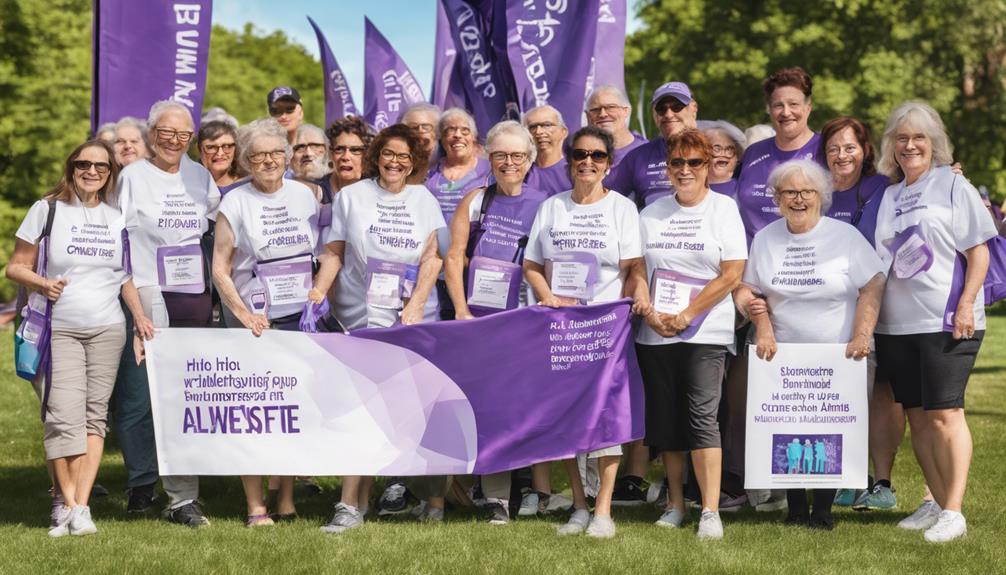
As organizers of the Alzheimer Walk 2022, we present a comprehensive overview of the event aimed at raising awareness and funds for Alzheimer’s research. The walk is scheduled for October 15th, starting at 9:00 AM at City Park. Participants will embark on a 5-mile route through scenic trails, promoting physical activity as a means to support brain health.
Throughout the walk, educational booths will provide information on Alzheimer’s disease, its symptoms, risk factors, and ongoing research initiatives. Experts will be available to answer questions and offer guidance on leading a brain-healthy lifestyle. Additionally, a moment of reflection will be held to honor those affected by Alzheimer’s, fostering a sense of community and support among participants.
Funds raised during the event will directly support Alzheimer’s research projects at local institutions, driving progress towards better treatments and ultimately a cure for this debilitating disease. By joining us at the Alzheimer Walk 2022, you’re taking a crucial step towards a future free from the challenges of Alzheimer’s.
Registration Information
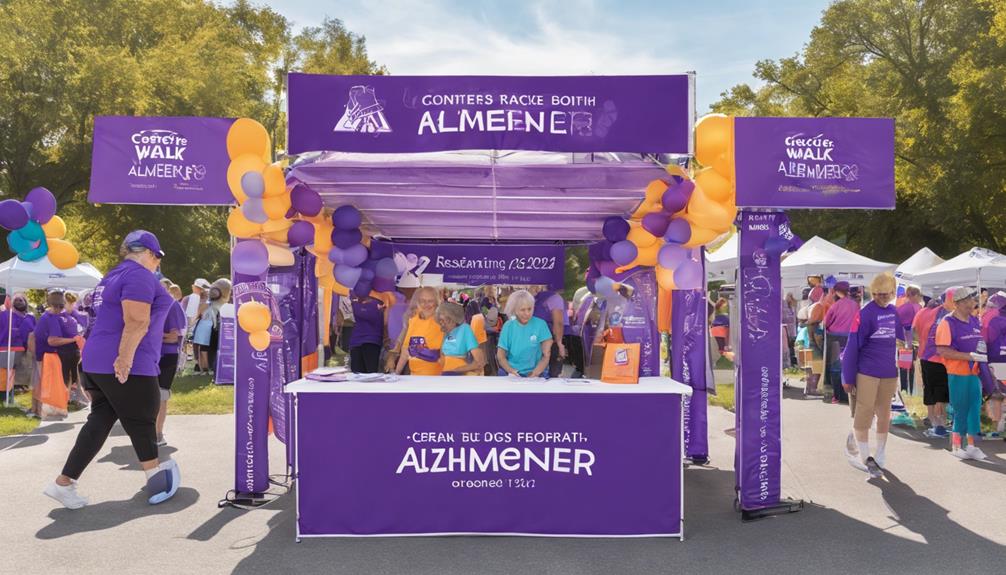
As we prepare for the Alzheimer Walk 2022, let’s focus on the key points regarding registration.
The deadline for registration, necessary documents, and available payment options are crucial aspects to consider.
Ensuring all requirements are met promptly will guarantee a smooth and successful registration process for all participants.
Registration Deadline
The registration deadline for the Alzheimer Walk 2022 is swiftly approaching, requiring participants to sign up before the specified date to ensure their participation in this crucial event. To successfully register for the walk, follow these key steps:
- Complete the Online Registration Form: Visit our official website and fill out the registration form with accurate information.
- Pay the Registration Fee: Secure your spot by submitting the required registration fee before the deadline.
- Receive Confirmation Email: After completing the registration process, expect a confirmation email containing important event details and instructions.
Don’t miss the opportunity to join us in raising awareness and support for Alzheimer’s research. Register now before it’s too late!
Required Documents
To complete your registration for the Alzheimer Walk 2022, ensure you have the required documents ready to provide accurate registration information. You’ll need a valid photo ID, such as a driver’s license or passport, to confirm your identity.
Additionally, have your contact information readily available, including your address, phone number, and email. Medical information, like emergency contacts and any relevant health conditions, is crucial for our team to ensure your safety during the walk.
If you’re registering on behalf of a team or group, gather all participants’ details beforehand. Having these documents prepared will streamline the registration process and help us provide you with the best support possible during the Alzheimer Walk 2022.
Payment Options
Our preferred method of payment for the Alzheimer Walk 2022 registration is through secure online transactions using major credit or debit cards. This ensures a quick and smooth process for participants. However, we understand that some individuals may prefer alternative payment options, so we also accept the following methods:
- Check Payments: Participants can mail in a personal or cashier’s check to complete their registration.
- Cash Payments: For those who prefer paying in person, cash payments can be made at our walk-in registration locations.
- Electronic Bank Transfers: Participants can also choose to make payments via electronic bank transfers for added convenience.
These options aim to accommodate various preferences and ensure that everyone can easily register for this important event.
Fundraising Tips
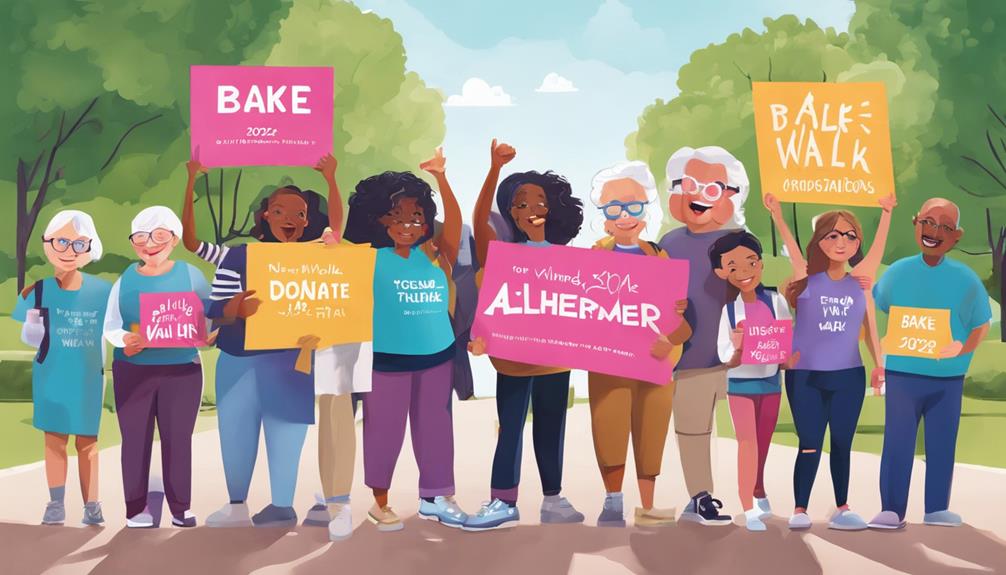
As we prepare for the Alzheimer Walk 2022, consider implementing these strategic fundraising tactics to maximize contributions towards research and support for those affected by Alzheimer’s disease.
Hosting fundraising events, such as bake sales, charity auctions, or benefit concerts, can attract donors while raising awareness about Alzheimer’s. Utilizing social media platforms and creating personalized fundraising pages can help reach a broader audience and make it easier for supporters to donate. Collaborating with local businesses for sponsorships or in-kind donations can also boost fundraising efforts.
Additionally, organizing a peer-to-peer fundraising campaign empowers participants to raise funds on behalf of your team, expanding your reach within their social circles. Offering incentives like exclusive merchandise or recognition for top fundraisers can motivate individuals to raise more money. Sending personalized thank-you notes to donors not only shows appreciation but also encourages continued support.
Lastly, sharing compelling stories of those impacted by Alzheimer’s can create an emotional connection, inspiring more individuals to donate generously to the cause.
Team Formation

Discussing the formation of teams for the Alzheimer Walk 2022 involves strategically assembling groups of dedicated participants committed to raising funds and awareness for Alzheimer’s research and support initiatives. As we prepare to create teams for this noble cause, here are some key points to consider:
- Diverse Skill Sets: When forming teams, it’s essential to ensure a diverse range of skills and abilities within each group. By including individuals with different strengths such as fundraising expertise, event planning skills, and social media proficiency, teams can effectively tackle various aspects of the walk.
- Clear Communication Channels: Establishing clear communication channels is crucial for team cohesion. Utilizing platforms like team chat groups, emails, and regular meetings can help keep all members informed, motivated, and on track towards their fundraising goals.
- Encouraging Team Spirit: Fostering a sense of unity and camaraderie among team members is vital. Encourage teamwork through team-building activities, shared goals, and celebrating milestones together to boost morale and create a supportive environment for all participants.
Route Details
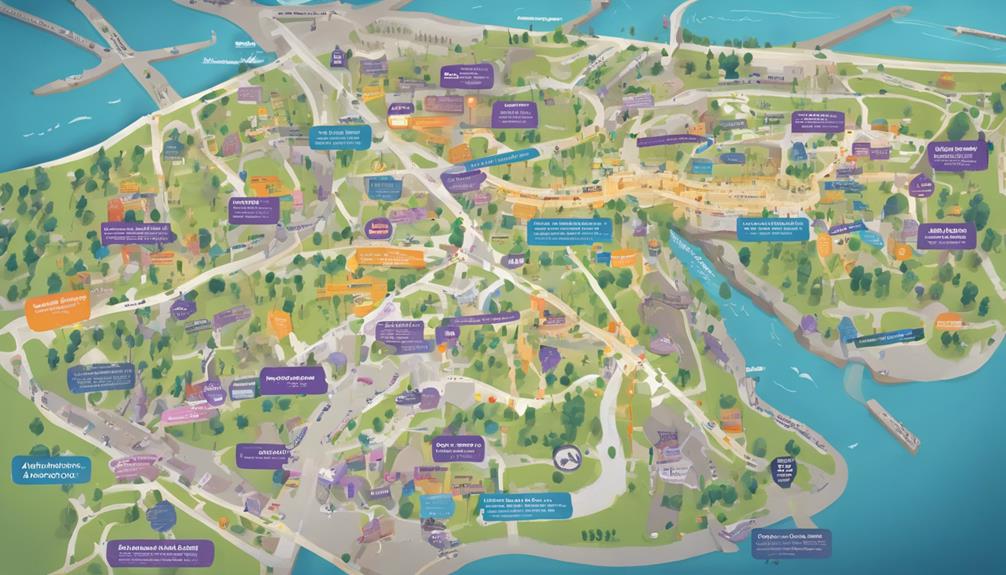
Analyzing the terrain and logistical considerations will be essential in determining the optimal route for the Alzheimer Walk 2022. Our team has meticulously evaluated various factors to create a route that is both scenic and safe for participants. The route covers a total distance of 5 kilometers, ensuring an enjoyable experience for walkers of all ages and abilities.
Route Details Table:
| Milestone | Description | Location |
|---|---|---|
| Starting Point | Where the walk begins | Central Park |
| Water Station 1 | First hydration stop for participants | Mile 1 |
| Rest Area | Place for participants to take a break | Mile 2 |
| Finish Line | Endpoint of the walk | Central Park |
Throughout the route, volunteers will be stationed at key points to provide assistance and ensure everyone’s safety. The path will showcase the beauty of nature, offering a peaceful and rejuvenating environment for all participants. Join us on this meaningful journey to support Alzheimer’s awareness and research.
Volunteer Opportunities
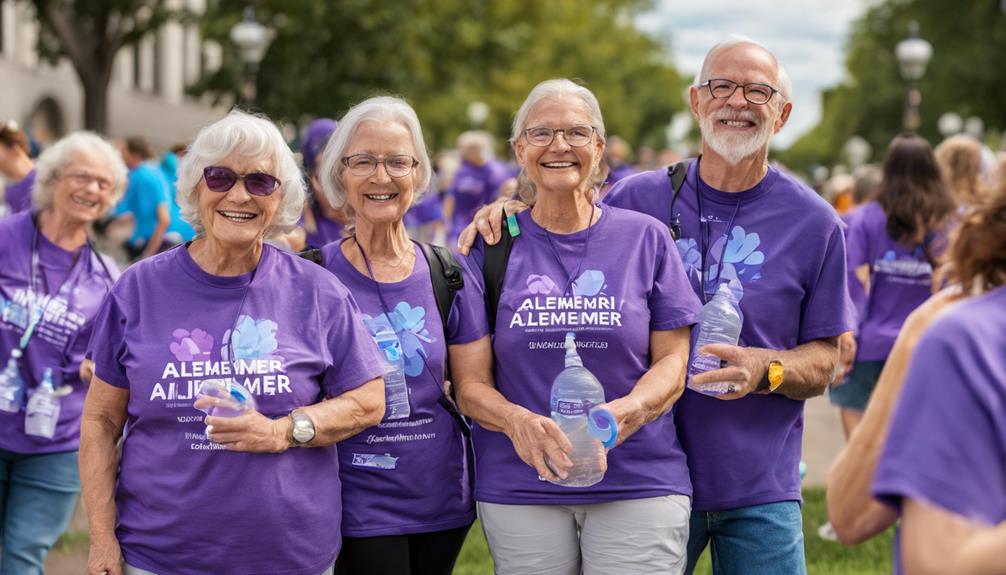
Volunteer opportunities for the Alzheimer Walk 2022 will enable individuals to actively contribute to the event’s success and impact on Alzheimer’s awareness and research efforts. Volunteers play a crucial role in ensuring the smooth operation of the walk and helping to create a memorable experience for all participants.
Here are some ways you can get involved:
- Registration and Check-In: Assist participants with the registration process, distribute event materials, and provide information about the walk.
- Route Support: Help guide walkers along the route, provide water stations, and offer encouragement to keep spirits high.
- Event Logistics: Support various event logistics such as setup, cleanup, and managing specific areas like the refreshment stations or information booths.
Sponsorship Options

Sponsorship options for the Alzheimer Walk 2022 provide valuable opportunities for businesses and organizations to support Alzheimer’s awareness and research efforts while gaining visibility and recognition within the community. By becoming a sponsor, you can showcase your commitment to a worthy cause while also increasing your brand’s exposure. Below is a table outlining the various sponsorship levels available for the event:
| Sponsorship Level | Contribution Amount | Benefits Included |
|---|---|---|
| Platinum Sponsor | $5000+ | Logo on event materials, prominent booth space |
| Gold Sponsor | $2500 – $4999 | Recognition in press releases, logo on event website |
| Silver Sponsor | $1000 – $2499 | Social media shoutouts, logo on event signage |
| Bronze Sponsor | $500 – $999 | Company name on event t-shirts, recognition in program |
| Supporter | $100 – $499 | Thank you mention during opening/closing ceremonies |
These sponsorship options offer varying levels of involvement, allowing each sponsor to choose the level that best fits their capacity to contribute to the fight against Alzheimer’s disease.
Event Day Schedule
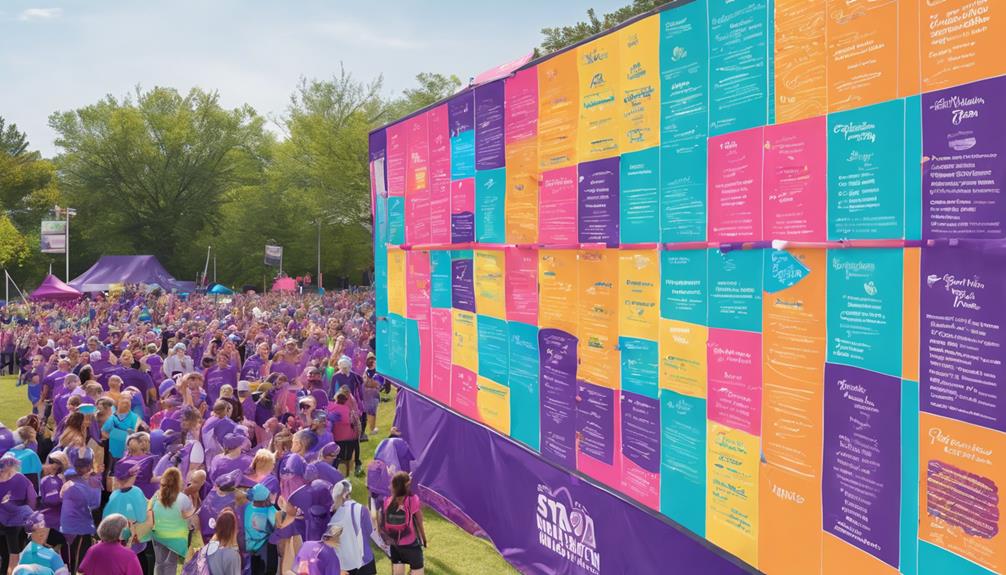
As we shift our focus to the upcoming Alzheimer Walk 2022 event day schedule, participants can anticipate a structured timeline filled with meaningful activities and engagements. The schedule aims to provide an enriching experience for all involved, fostering a sense of community and support for those affected by Alzheimer’s. Below is a brief overview of what the event day will entail:
- Registration and Welcome Booth: The day will kick off with registration where participants can pick up their event materials and connect with fellow walkers. A welcome booth will provide important information about the day’s schedule and activities.
- Opening Ceremony: A heartfelt opening ceremony will set the tone for the walk, featuring inspiring speeches and special performances. Participants will have the opportunity to come together as a community united in the fight against Alzheimer’s.
- Walk Route and Pit Stops: The walk itself will take participants through scenic routes, with designated pit stops offering water, snacks, and opportunities to learn more about Alzheimer’s research and support services.
Participant Safety Guidelines

To ensure the safety of all participants during the Alzheimer Walk 2022, detailed guidelines have been established to address various aspects of the event. Our priority is to create a secure environment where everyone can enjoy the walk while minimizing any potential risks. Below are the safety guidelines that we kindly ask all participants to adhere to:
| Safety Guidelines | Details |
|---|---|
| Check-In | All participants must check-in before the event starts |
| Hydration | Stay hydrated by drinking water provided along the route |
| Emergency Contacts | Provide emergency contact information at registration |
| First Aid Stations | First aid stations will be available throughout the event |
| Weather Awareness | Be aware of weather conditions and dress accordingly |
Awards and Recognition

Upon completing the Alzheimer Walk 2022, participants achieving notable milestones will be recognized and awarded for their remarkable contributions in the fight against Alzheimer’s disease. Our awards aim to honor dedication and support for this noble cause. Here’s what you can expect:
- Top Fundraiser Award: This award recognizes the individual or team that raises the most funds to support Alzheimer’s research and care. Your fundraising efforts directly impact the advancement of treatment and support services for those affected by Alzheimer’s.
- Longest Distance Walked Award: This accolade celebrates those who go the extra mile, both figuratively and literally. It acknowledges participants who walk the longest distance during the event, symbolizing perseverance and commitment in the fight against Alzheimer’s.
- Most Inspirational Participant Award: This award highlights the individual whose story and dedication inspire others. Whether through personal experiences, advocacy, or support, this participant embodies the spirit of hope and unity in the Alzheimer Walk community.
Impact of Your Support

Our collective support has led to significant research advancements in the field of Alzheimer’s disease, bringing us closer to understanding its complex mechanisms and potential treatments.
Additionally, our contributions have provided crucial support for caregivers, offering them resources, respite, and guidance in navigating the challenges of caring for individuals with Alzheimer’s.
Through our combined efforts, we’ve significantly raised awareness about the impact of Alzheimer’s disease, fostering a more informed and compassionate community dedicated to supporting those affected by this condition.
Research Advancements Achieved
With the unwavering support of our community, significant research advancements have been achieved in the field of Alzheimer’s disease. These advancements are a direct result of your generous contributions and dedication to finding a cure for this debilitating condition.
Here are some of the key research achievements made possible by your support:
- Identification of new biomarkers for early detection of Alzheimer’s.
- Development of innovative treatments targeting specific pathways involved in the progression of the disease.
- Progress in understanding the genetic factors contributing to the development of Alzheimer’s, leading to personalized treatment approaches.
Your support has truly made a difference in advancing our knowledge and treatment options for Alzheimer’s disease.
Support for Caregivers Provided
Through your unwavering support, we’ve been able to provide essential care and assistance to caregivers of individuals affected by Alzheimer’s disease, making a tangible impact on their well-being and resilience. Caregivers often face immense challenges, both physically and emotionally, as they support their loved ones with Alzheimer’s.
With your contributions, we’ve been able to offer respite care services, support groups, educational resources, and counseling sessions tailored to their needs. These services not only equip caregivers with practical skills and knowledge but also provide them with a much-needed emotional outlet and a sense of community.
Your support has helped caregivers navigate the complexities of caregiving, reducing burnout, and enhancing their overall quality of life.
Awareness Raised Significantly
The collective efforts of our community have significantly heightened awareness about Alzheimer’s disease, catalyzing a shift in public understanding and support for those affected. Through our united initiatives, we’ve made a substantial impact on the perception and resources available for individuals living with Alzheimer’s and their caregivers.
Impact of Your Support:
- Increased Early Detection: Education campaigns have led to more individuals recognizing early signs of Alzheimer’s, enabling timely diagnosis and intervention.
- Policy Advocacy: Our advocacy efforts have influenced policymakers to prioritize funding for Alzheimer’s research and support programs.
- Reduced Stigma: By fostering open discussions and sharing personal experiences, we’ve helped reduce the stigma surrounding Alzheimer’s, encouraging more empathy and support within our communities.
Ways to Get Involved

Numerous opportunities exist for individuals eager to participate in the upcoming Alzheimer Walk 2022 and contribute to the cause of raising awareness and funds for Alzheimer’s research.
One way to get involved is by registering as a walker. By joining the walk, you can show your support for individuals affected by Alzheimer’s and their families. Additionally, forming a team with friends, family, or coworkers can amplify your impact and create a sense of camaraderie.
Another way to contribute is through fundraising. You can set up a personal fundraising page and reach out to your network for donations. Every dollar raised goes a long way in supporting research efforts to find a cure for Alzheimer’s disease.
Furthermore, volunteering at the event is a crucial way to get involved. You can assist with registration, distribute water along the route, or help with event setup and cleanup. Your time and dedication are invaluable in making the Alzheimer Walk 2022 a success.
Closing Thoughts

In reflecting on the Alzheimer Walk 2022, it’s evident that every contribution, whether big or small, plays a crucial role in advancing Alzheimer’s research and support efforts. As we conclude this year’s event, we want to express our gratitude for all the participants, donors, and volunteers who’ve made this possible.
Here are some closing thoughts to ponder:
- Impact of Unity: Together, we’ve shown that when individuals come together for a common cause, significant progress can be made in understanding and combating Alzheimer’s disease.
- Community Support: The outpouring of support from the community highlights the importance of raising awareness and funds for Alzheimer’s research and support programs. Your involvement has a direct and positive impact on individuals and families affected by this condition.
- Continued Advocacy: While the walk may be over, our advocacy and support for those with Alzheimer’s must persist. Let’s carry this momentum forward by staying informed, advocating for policy changes, and supporting ongoing research efforts.
Thank you for being part of the Alzheimer Walk 2022 and for your commitment to making a difference in the lives of those impacted by Alzheimer’s disease.
Frequently Asked Questions
Can Participants Bring Their Pets to the Alzheimer Walk 2022?
Yes, participants can bring their pets to the Alzheimer Walk 2022. It’s a great way to enhance the experience for both the attendees and their furry friends.
However, it’s essential to ensure that all pets are well-behaved, leashed, and up to date on vaccinations to maintain a safe and enjoyable environment for all participants.
Additionally, bringing pets can provide comfort and support, promoting a sense of community and well-being during the event.
Are There Accommodations Available for Individuals With Disabilities at the Event?
Absolutely, we’ve various accommodations in place for individuals with disabilities at the event. These include accessible parking, designated rest areas, and support staff to assist with any needs.
We strive to ensure that everyone can participate fully and comfortably. Our goal is to create an inclusive environment where all attendees can enjoy the event without any barriers. We prioritize accessibility to make the experience positive for everyone involved.
Will There Be Food and Drinks Available for Purchase at the Walk?
Yes, there will be food and drinks available for purchase at the walk. A variety of options will cater to different tastes and dietary preferences. We ensure that participants have access to refreshments throughout the event to stay energized and hydrated.
Our goal is to provide a seamless experience where attendees can enjoy the walk without worrying about sustenance. Rest assured, our team is dedicated to making the event enjoyable for everyone.
Is There a Minimum Age Requirement for Participants to Join the Walk?
There’s no minimum age requirement for participants to join the walk.
At events like these, encouraging all to come together for a cause fosters a sense of community and support.
We believe that everyone, regardless of age, can contribute to raising awareness and funds for Alzheimer’s research.
This inclusive approach helps spread awareness across generations, making a greater impact on the fight against this disease.
Are There Any Special Promotions or Giveaways for Participants at the Alzheimer Walk 2022?
Yes, there are special promotions and giveaways for participants at the Alzheimer Walk 2022. These incentives are designed to encourage engagement and support for the cause.
Participants can look forward to receiving items such as t-shirts, water bottles, and other branded merchandise. Additionally, there may be exclusive offers or discounts from event sponsors.
These promotions not only reward participants but also help raise awareness and funds for Alzheimer’s research and support programs.
Conclusion
In conclusion, the Alzheimer Walk 2022 will be a monumental event that will leave a lasting impact on the fight against Alzheimer’s disease.
With your support, we’ll stride towards a brighter future, where memories are cherished and minds are preserved.
Join us as we take giant leaps towards a world free from the grasp of this devastating disease.
Together, we can make a difference that will be felt for generations to come.









